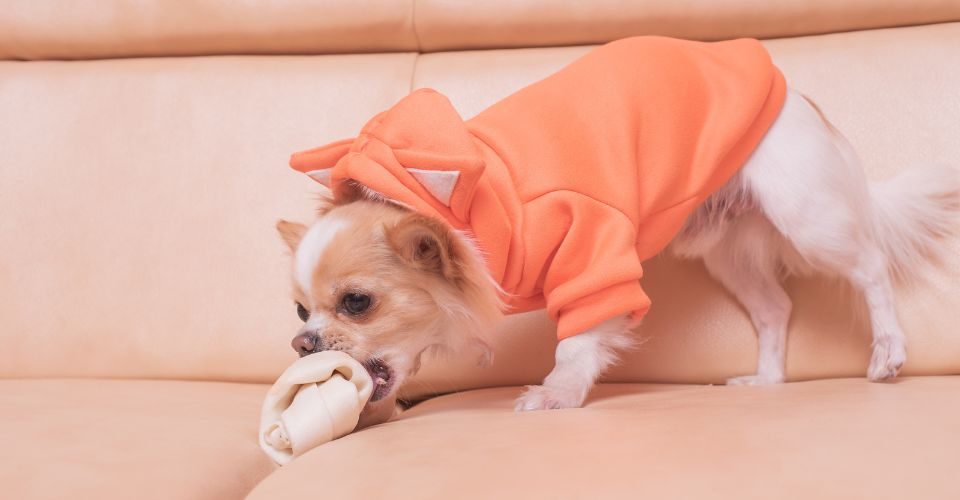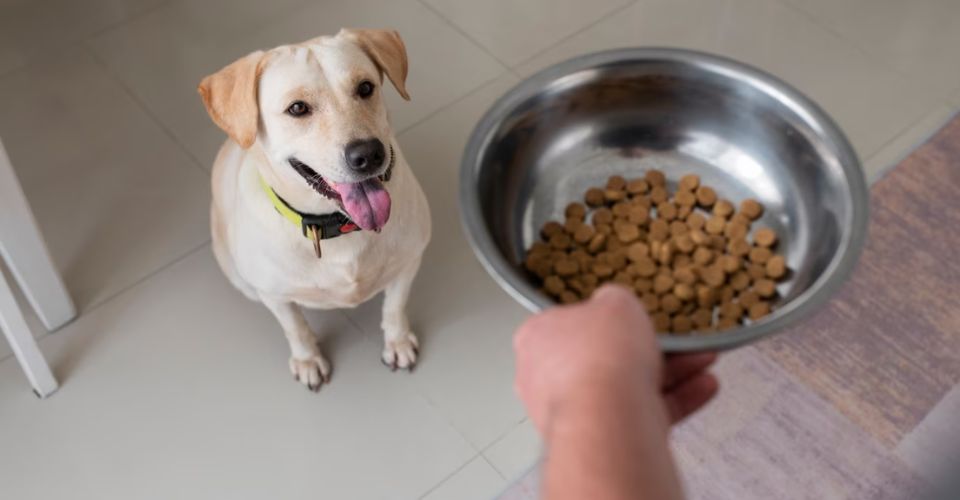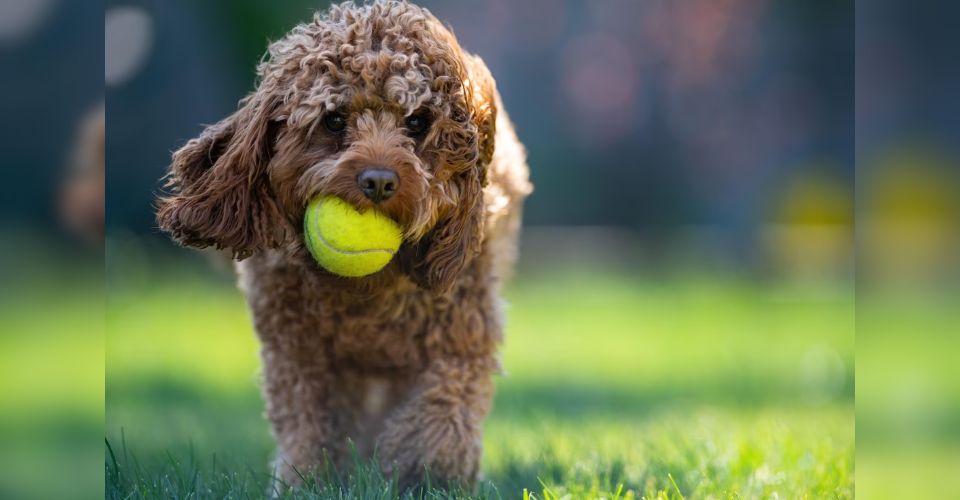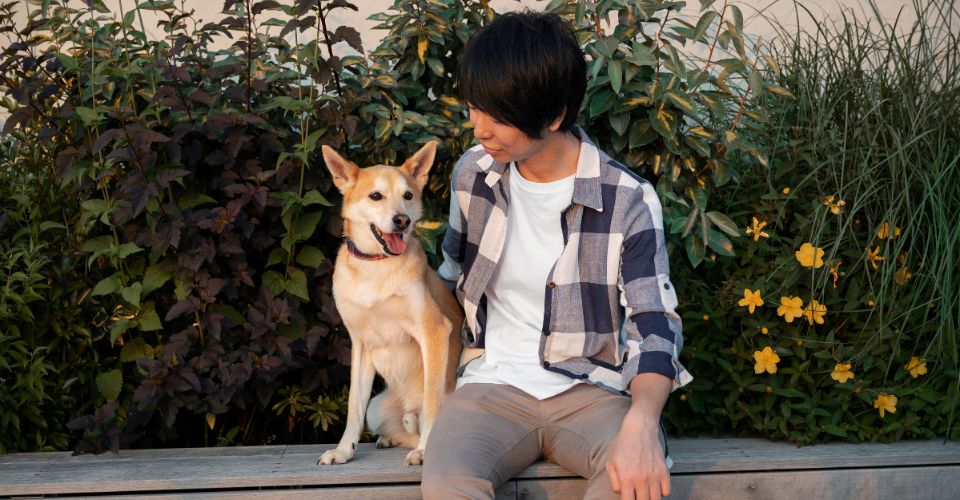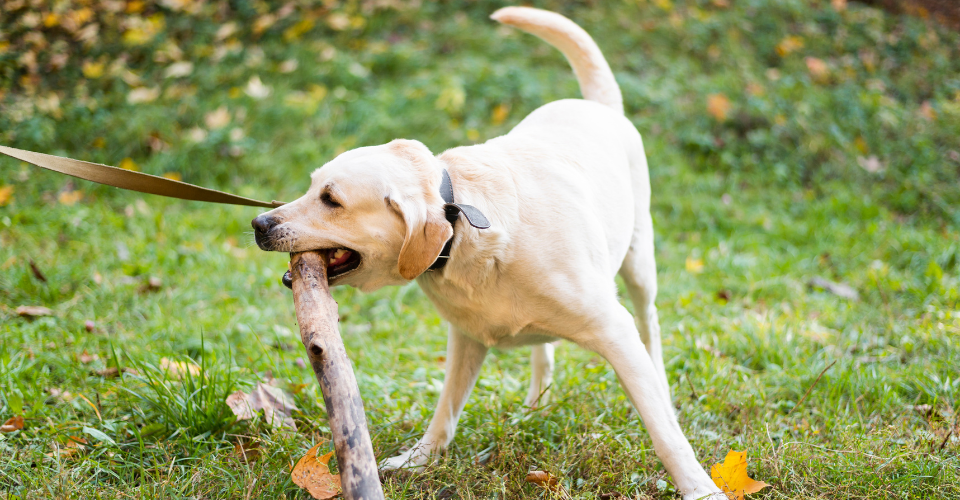Do you ever find yourself pulling away from your furry friend when they start nibbling on your clothes? It may seem harmless yet annoying, but have you ever wondered why your dog does it? Well, you are not alone!
Many dog owners have questioned the reasoning behind this curious behavior. So, why does my dog nibble on my clothes? In this blog post, we will explore the various reasons behind this behavior and provide tips on addressing it. Grab a seat and get ready to uncover the mysteries behind your dog’s nibbling habits.
Why Does My Dog Nibble on My Clothes?
1. Teething
As per the American Kennel Club (AKC), it is normal behavior in puppies to nip at different objects when their teeth begin erupting. If your clothes are in approach, your newborn will not stop short of testing his brand-new teeth on those. You can expect your pup to begin nibbling by the age of three weeks as his teeth start coming out. Since incisors take the lead, your dog will attack your clothes only with the teeth on the front first. Common signs of teething include gums bleeding, drooling, and bad breath.
2. Taste
Dogs have a penchant for crazy tastes like human sweat. When given a chance, your dog will not stop licking your body or nibbling at your clothes right after a good workout session or when it is too hot. Dogs yearn to explore the world around them with the help of their mouths. When they find their favorite taste during this exploration, they indulge in it further. You might also find your pooch nibbling at your bedsheet when you lay on it sweating.
Did You Know?
Men produce more sweat than women. If you are a male and your dog is into your sweat, the chances of him nibbling at your clothes are higher.
3. Playtime
The AKC points out that dogs do not necessarily bite to hurt someone. They do it so when asking for playing as well. It is like pulling someone out to the ground and saying, “come, let us play!” Your dog might be bored or lagging on his physical activity requirements (more often the case if he is a big boy like the Bandogge Mastiff). Since you do not have any leash around your neck, your dog will only find your clothes as a suitable option to pull you out of your chair!
4. Separation Anxiety
Separation anxiety makes a dog nibble at his owner’s clothes—but not in a typical way. When you are away, your dog will miss you; if he finds your clothes, he will nibble them because of the scent. Unlike a destructive behavior in which canines turn to chew whatever comes their way, this kind of reaction is special: it is a cute alternative in which your dog stays close to your memories. But remember, it could be bad for his health. He could end up having a bad eating schedule and losing weight rapidly.
5. Breed and Genetics
Some dogs—Corgis and German Shepherds, for instance—have the instinct to nip at the feet of the herding cattle. Having such genetics, they might choose their owners’ clothes to bite at, thinking of them as a part of the herd. However, experts also say that the breed is not solely responsible for such a demeanor. Several other factors can also make a dog bite. Moreover, families with kids must be cautious of this fact even more.
6. Boredom
Boredom is a motivating force for our canine pals to engage in entertaining tasks. For them, digging, barking, and chewing are classified as such. If your clothes come in the way—they will be nibbled at! Dogs were bred to work alongside human beings. Without either the company or enough work, they do not get the feeling of fulfilling their purpose and take matters into their own hands. Other likely symptoms of apathy in dogs include bad sleeping and eating habits.
7. Unruliness
Unruliness in dogs can be a leading cause of nibbling on clothes. Dogs that are untrained or have a herding or destructive nature may be more likely to engage in this behavior. These impulsive dogs have no qualms about nibbling on clothes and may even tear them away. Furthermore, they may attempt to bite their owners as well. Dogs who have not been properly socialized or trained may not understand that nibbling on clothes is unacceptable behavior. As a result, it is crucial to provide your dog with the necessary training and socialization to prevent this behavior from becoming a problem.
8. Encouragement
Dogs are quite eager to seek praise. If you appreciate your dog’s nibbling whenever he aims for your clothes, you only inculcate in him that it is a good thing. The more he does it, the more he will be praised. You might be doing it only unknowingly. It might be just a petting session, and you have a handful of treats you want to give your dog. But feeding his favorite food would not be a good idea if he nibbles at the moment and you ignore it.
How to Tell if My Dog Is Nibbling or Biting?
One of the challenges of being a dog owner is being able to distinguish between nibbling and biting behaviors in dogs. While nibbling is a common behavior in dogs, it is important to be able to recognize when their behavior may turn aggressive.
According to experts, dogs exhibit certain signs when they are about to deliver a serious bite. These signs include a stiff body, no noises, and a head-on approach. Additionally, it’s important to be aware that some behaviors traditionally associated with happiness in dogs, such as tail wagging, can also indicate anger or aggression. If you notice any of these signs in your dog, taking precautions is important to prevent the situation from escalating. Here are some tips on how to tell if your dog is nibbling or biting:
- Avoid petting your dog if they are eating, nursing, or chewing on a toy or bone. This will help prevent them from becoming possessive or protective of their food or toy, which could lead to aggressive behavior.
- If your dog is visibly agitated, such as barking or growling, keep a distance and do not approach them until they have calmed down. This will help prevent the situation from escalating and minimize the risk of a bite.
- If your dog is injured but angry, say he has been barking or growling, giving them space to calm down before attempting to approach them is best. This will help prevent them from becoming defensive and aggressive due to their pain or discomfort.
- Avoid keeping mischievous children around your dog, as they may engage in behaviors that provoke your dog, such as pulling their tails or ears. This can cause your dog to become agitated and lead to aggressive behavior.
How Do I Stop My Dog From Nibbling on My Clothes?
Dos
- Playing Regularly: Engage in different activities with your dog and never let him get bored. Even if you have a hard time staying with him, just make sure he has plenty of mind-stimulating toys and puzzles.
- Chewable Toys: Supplant your clothes with some chewable toys. Just make sure that your dog has a lot of them and that he loves them too. You can hope that he will eventually leave your clothes one day! A bonus: it is great for your dog’s dental health.
- Training: Ensure that your dog is neither unruly nor undertrained. Just teach him some simple commands, such as “leave it,” and you must be able to get him off your clothes. If he does it, reward him.
- Discouragement: Just do not appreciate your dog nibbling on your clothes. Push him away (only gently) when he approaches to do so.
Don’ts
- Over Stimulation: Never exercise your dog too much in the quest to keep him busy. Too much stimulation can also lead to chewing behavior, causing other health issues.
- Hurry: Do not feel overwhelmed when your dog does not respond effectively, even after hard work. Inculcating new things in his mind takes time. It might take weeks before you see any results.
Should I Worry About My Dog Nibbling on My Clothes?
If your dog nibbles on your clothes occasionally and does not cause any harm, there is no need to worry about it. However, if your dog starts to nibble too hard and it seems like aggressive biting, it may be a sign of an underlying issue. In such cases, it is important to seek professional help from a veterinarian.
They can examine your dog and determine if any medical condition may be causing this behavior. Observing your dog’s actions and behavior closely is also essential to better explain the situation to the veterinarian. They may suggest some training techniques or behavioral modifications prevent such behavior in the future. Ignoring this behavior can lead to more significant problems in the future, and it is crucial to take the necessary steps to prevent any harm.
When Should I Seek Professional Help?
While nibbling behavior is generally harmless, certain situations may warrant seeking professional help. If your dog’s nibbling behavior becomes excessive, or if you notice any other unusual behaviors, it is essential to seek help from a veterinarian or a professional dog trainer.
You should seek professional help if your dog is nibbling on your clothes to the point where it is causing damage. If your dog is tearing apart your clothes or causing harm to your skin, this could be a sign of aggression or an underlying medical condition that needs to be addressed. Seeking professional help can help identify the root cause of the behavior and provide appropriate solutions.
Another situation where you should seek professional help is if your dog is nibbling on inappropriate objects or engaging in destructive chewing behavior. This could be a sign of anxiety, boredom, or frustration. A professional trainer can help identify the root cause of the behavior and provide effective strategies to redirect your dog’s chewing behavior onto appropriate objects or toys.
If you have tried to correct your dog’s nibbling behavior but have not seen any improvement, seeking professional help is also recommended. A professional trainer can provide additional guidance and support to help you and your dog overcome the behavior.
Common Myths About Dog Nibbling
Dog nibbling is a common behavior among dogs, but several myths and misconceptions surrounding this behavior can lead to misunderstandings between dog owners and their pets. This section will discuss some common myths about dog nibbling and separate fact from fiction.
Myth #1: Nibbling Is a Sign of Aggression
While it is true that some dogs may nibble as a form of aggression, it is not always the case. In many instances, nibbling is a harmless and even affectionate behavior that dogs use to show their love for their owners. Dogs may also nibble out of boredom, anxiety, or curiosity, and it is essential to understand the context in which the behavior occurs to determine whether it’s a cause for concern.
Myth #2: Nibbling Is a Sign of Dominance
Nibbling is not a sign of dominance. In fact, many dogs will nibble on their owners to seek attention or show affection. Dogs do not have a concept of dominance as humans do, and interpreting nibbling behavior as a power play can lead to misunderstandings and unnecessary conflict.
Myth #3: Nibbling Is a Sign That Your Dog Is Hungry
Correct, but it is not the only reason why they nibble. Dogs may nibble for a variety of reasons, including boredom, anxiety, and even teething. Pay attention to the context of the nibbling behavior to understand what your dog is trying to communicate.
Myth #4: Nibbling Is a Sign That Your Dog Is Untrained
Dogs may be more prone to nibbling, but it is not necessarily a sign of a lack of training. Even well-trained dogs may nibble on occasion, and it is important to understand the reasons behind the behavior before attempting to correct it. Punishing your dog for nibbling behavior can lead to more significant behavioral problems down the road.
Conclusion: Why Does My Dog Nibble on My Clothes?
Understanding why your dog nibbles on your clothes is important for building a stronger bond with your furry friend. From teething to boredom to encouragement, there are several reasons why dogs nibble on clothes. It is essential to distinguish between harmless nibbling and more aggressive biting behavior and provide the necessary training and socialization to prevent this behavior from becoming problematic. By taking the time to understand your dog’s behavior and providing the proper care and training, you can enjoy a happy and healthy relationship with your furry friend for years to come. So the next time your dog starts nibbling on your clothes, consider the reasons behind their behavior and take appropriate action to address it.

